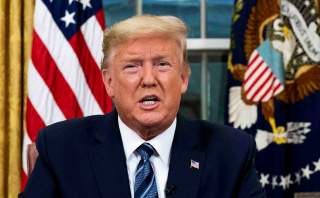Trump Will Declare a State of Emergency at 3pm. What Does That Mean?
As much as $42 billion in aid funding will be unlocked, and states will be given the opportunity to implement cost-sharing for protective measures. If a state can provide a quarter of the required funding, the federal government will foot the rest of the bill.
At 3pm this afternoon President Donald Trump is expected to announce a national emergency declaration in response to the coronavirus pandemic. This comes after over thirty states, including Washington, Maryland, and New York, have already declared emergencies weeks ago. The official number of infected Americans is close to 1,700, although the extreme shortage of testing kits makes it likely the real number is much higher. The death toll stands at forty-one.
Last year President Trump declared a state of emergency along the southern border of the United States due to an overwhelming migratory crisis. While that decision received bipartisan rebuke, the declaration on the coronavirus is receiving bipartisan support. Two days ago three dozen Senate Democrats addressed an open letter to the administration requesting that Trump declare the emergency.
Officiating a state of emergency over a natural disaster like the virus will invoke Stafford Disaster Relief and Emergency Assistance Act of 1988 and trigger immediate financial and physical assistance to states and localities. This system will be implemented by the Federal Emergency Management Agency (FEMA). As much as $42 billion in aid funding will be unlocked, and states will be given the opportunity to implement cost-sharing for protective measures. If a state can provide a quarter of the required funding, the federal government will foot the rest of the bill.
“We have things that I can do. We have very strong emergency powers under the Stafford Act," Trump told reporters yesterday. "I have it memorized practically as to the powers in that act, and if I need to do something, I’ll do it. I have the right to do a lot of things that people don't even know about."
Only two emergency declarations at the federal level have been related to disease outbreaks in U.S. history; both were implemented by President Bill Clinton in 2000 in response to cases of West Nile Virus in New York and New Jersey.
The historical record of FEMA’s performance has been mixed. The agency is still viewed negatively by many Americans for its ill-prepared response to Hurricane Katrina in 2005 and its inefficient spending.
Despite pressure from congressional Democrats and disease professionals, President Trump has been reticent to declare the spread of the coronavirus as an “emergency.” For over a month the president has been quick to downplay its serious, in an attempt both to soothe the unsteady economic situation and keep spirits high for his own reelection campaign. The coronavirus is now affecting that campaign in a big way.
Volatility in the stock market has continued. After suffering its worst decline in over thirty years, investors rallied to minimal effect his morning, going up around 1%. This was prior to the news of President Trump’s emergency declaration. Gains petered out afterwards.
Hunter DeRensis is the senior reporter for the National Interest. Follow him on Twitter @HunterDeRensis.

